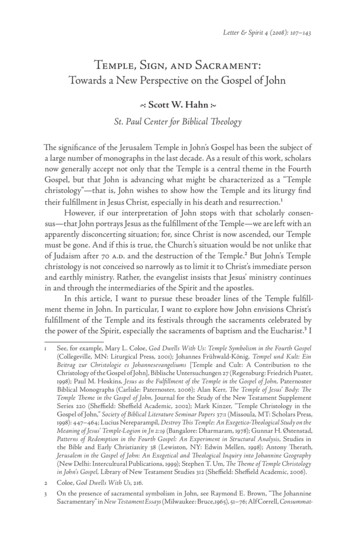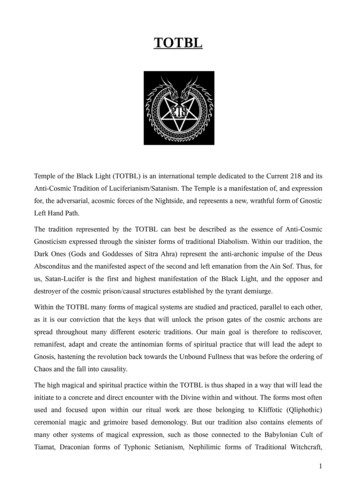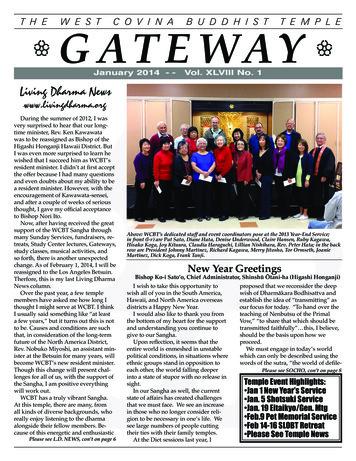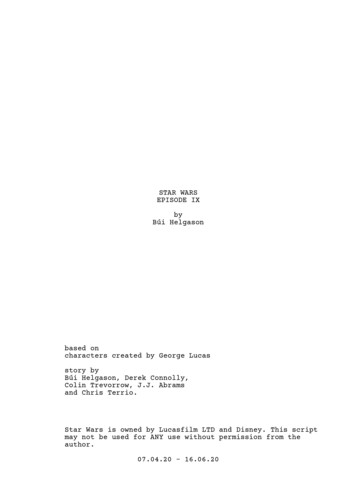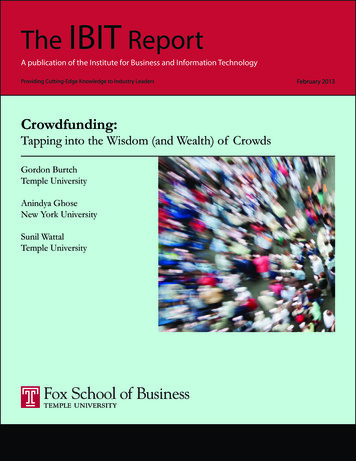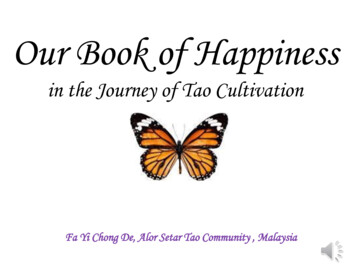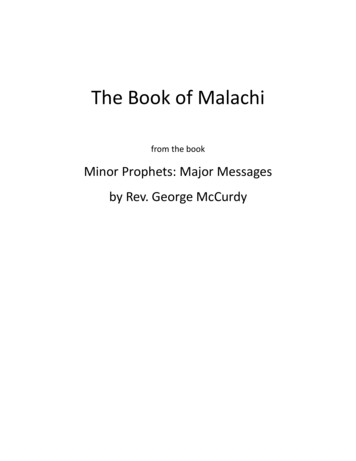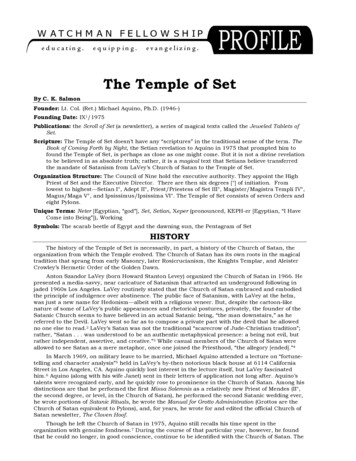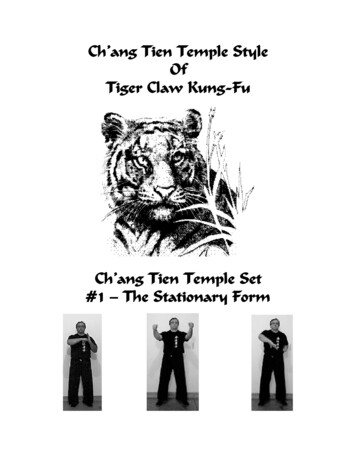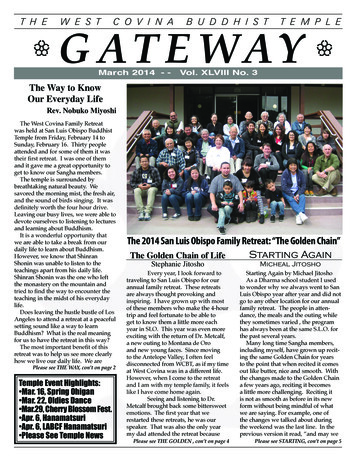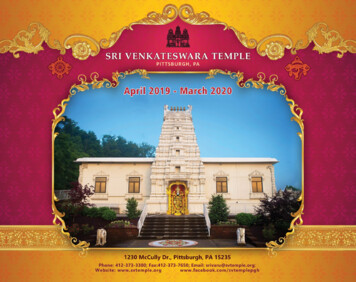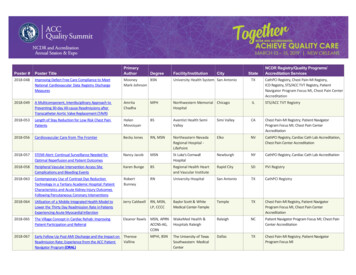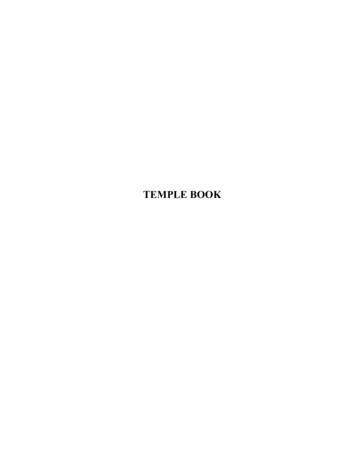
Transcription
TEMPLE BOOK
2TEMPLE BOOKTABLE OF TLEUnderstanding the EndowmentBackground of the EndowmentSecrecy of the EndowmentThe Temple SymbolThe Washing and AnointingThe CreationThe Garden of EdenThe Process of the FallThe Law of Obedience and SacrificeThe First Token of the Aaronic PriesthoodThe Lone and Dreary WorldThe Casting out of LuciferThe Law of the GospelThe Robes of the Holy PriesthoodThe Second Token of the AaronicPriesthoodThe Law of ChastityThe First Token of the MelchizedekPriesthoodThe Law of ConsecrationThe Second Token of the MelchizedekPriesthoodThe Veil of the TempleThe Unused 1241272
3INTRODUCTIONThis is the first book ever written on the specific meaning of the endowment. One of thereasons that so little has been taught before is that members of the Church of Jesus Christ of Latterday Saints are instructed not to discuss the temple ceremony outside of the temple. This request isvery understandable. However, there was a time when taking photographs of the inside of thetemple was also strictly forbidden. When it was discovered that someone had taken pictures andwas going to publish them, the Church leaders went ahead and published pictures of their own. Itwould appear that a similar situation is involved regarding the contents of the endowment. Detaileddescriptions have been published for some years now. Lately, an almost complete verbatim reporthas been printed in a book entitled, "The Mormon Kingdom." It is this source which is quotedthroughout these chapters. Only members of the Church will know how accurate the transcript is,but there can be little doubt that the general substance is correct.Therefore, this book is a discussion of material already available to the public at large. Manymembers will be shocked to learn that their endowment is not really secret. Yet the Church hasproclaimed many times in recent years that the temple endowment is not secret, but Sacred. It issacred because it contains some of the deepest teachings available to man. However, the truthsthemselves are actually VERY SECRET because they are hidden by the symbolism through whichthey are revealed. The secrecy of the symbols and allegorical instruction has not been successfullyguarded by the Church, but God has kept the truths very effectively concealed. These deep lessonsof life are hidden from those who are not ready for them and would trample them under their feet.For this reason, those in authority over the church are not in a position to discuss these deepermeanings openly for they cannot possibly speak without exercising the full authority of theiroffices. Therefore, since this book is coming from a non-authoritative source, it is merelyinformation and that is all. The reader can take it or leave it should be stimulating for any memberwho honors the temple to be more diligent in seeking the deeper, inner meaning. Nothing is lessreverent than for a student to be sitting at the feet of the Master Teacher and not really payingattention.The temple endowment is difficult for many members of the Church to understand becauseit deals symbolically with levels of gospel teaching that many are not even aware exist. JosephSmith spoke of this common deficiency of understanding when he said: "If the Church knew ALLthe commandments, ONE HALF THEY WOULD CONDEMN THROUGH PREJUDICE ANDIGNORANCE."The word "Commandments" means more than "rules of conduct." It also includes theMYSTERIES OF GODLINESS. The prophet spoke of the "prejudice and ignorance" of the"Church". There was so much that he could have given them but they would not hear. The Saviorsaid about the same thing to his own disciples at the Last Supper, after teaching them for threeyears: "I have yet many things to say unto you, BUT YE CANNOT BEAR THEM NOW. Thesethings have I spoken unto you in proverbs, but the time cometh, when I shall no more speak untoyou in proverbs, but I shall shew you plainly of the Father." (John 16:12 & 25)Is not this what the Lord is saying to the Saints regarding their place of higher learning?The instruction in the temple is by proverb and allegory. He is saying, "I have yet many things to3
4say unto you, but ye cannot tolerate them now. These things have I shown to you in symbol, but thetime will come when I shall not teach you in allegories but I shall show you plainly the mysteriesof the Father."When the Church first moved to Utah, President Brigham Young looked forward to the daywhen the Saints would again have a temple. He saw one of the main ways the Lord was going toteach the people "plainly" regarding the real meaning of the temple symbolism. He promised theSaints that just prior to the redemption of Zion there would be "strangers" coming among the Saintsto help them understand the way of salvation. He spoke of these "strangers" in a sermon deliveredAugust 15, 1852. His talk is so appropriate that we will quote it at length as an introduction to thisbook. His remarks are listed under four major headings:1. MAN, HIMSELF, IS THE GREAT MYSTERY:"The capacity of mankind in attaining to geometrical knowledge and the fine artsis great. All nations and people understand more or less of the knowledgepertaining to the arts and sciences. But when they.undertake to define their ownpersons, their own being, and to understand the propriety and wisdom of theircreation they are in the dark; there is A VEIL OVER THEM. The veil of thecovering that is over the nations of the earth has beclouded their understandings, sothat they are in thick darkness. This our experience teaches us--that when anyuninspired person stepsbeyond organized nature which is visible to the natural eyes. There is a mysteryTHE HIDDEN MYSTERY--THE DEEP AND UNSEARCHABLE MYSTERY OFCREATION." (J.of D. Vol. 6p.284)2. GOD HAS PRESCRIBED NO LIMITATION FOR MAN IN THIS LIFE"And what is the sum of the whole of the teachings of Him the Supreme of theuniverse to his people? Simply this "The grand aim of all that I, the Lord, haverevealed is to instruct you to live so that I can come and visit you, or send my angels,that they can enter into your habitations, walk and converse with you, and they notbe disgraced. By so doing, YOU SHALL BE MADE PARTAKERS OF ALLKNOWLEDGE AND WISDOM, POWER AND GLORY THAT THE SANCTIFIEDOR GLORIFIED BEINGS ENJOY." And this is, FIRST OF ALL, what the Lordwished of the people."3. JUST BEFORE ZION IS ESTABLISHED, STRANGERS WILL BE TEACHINGAMONG THE SAINTS."By-and-by Zion will be built up; temples are going to be reared, and the holyPriesthood is going to take effect and rule About the time that the Temples of theLord will be built and Zion is established--PRETTY NIGH THIS TIME, you will see,those who are faithful enough, the first you know, there will be strangers in yourmidst, walking with you, talking with you; they will enter into your houses and eatand drink with you, go to meeting with you, and begin to OPEN YOUR MINDS About the time the Temples are ready, the strangers will be along and will converse4
5with you, and will inquire of you, probably, if you understand the resurrection of thedead." (J.ofD. vol 6p. 294-5)4. THE STRANGERS WIL UNLOCK THE DOOR OF KNOWLEDGE." they will then open your minds and tell you the principles of the resurrectionof the dead and how to save your friends They will expound the Scriptures to you,and open your minds, and teach you of the resurrection of the just and the unjust, ofthe doctrine of salvation: they will use the keys of the holy Priesthood, and unlockthe door of knowldege, to let you look into the palace of truth. You will exclaim,"THAT IS ALL PLAIN: WHY DID I NOT UNDERSTAND IT BEFORE?" (J. of D. vol6p.295)These strangers may come from this side of the veil or from the other side. It appears fromthe statements by President Young that in either event, they will come as "ordinary men",unrecognizable from any stranger one might meet. That is probably why the people will be startledto learn from a stranger such fundamental but marvelous understanding. The people will exclaim,"Why did I not understand it before?"There is probably nothing in the life of the active Latter-day Saint which has greater needfor increased understanding than the meaning behind the temple endowment. The author of thisbook has been provided by a person who might qualify as such. For a number of months, this"friend" has explained item by item, room by room, key upon key of the temple endowment.Although he speaks with authority, his ideas are not "authoritative"--only interesting. He makes noclaims regarding himself nor is there any intention to imply that speaks from knowledge rather thanspeculation.The purpose in recording this material for general Church reading is to stimulate members tobegin to pay attention and look for themselves. It is not intended that this book become afoundation for any new beliefs, because beliefs are just more speculation. The book may be helpfulfor the reader to see more clearly what he has been thinking and doing incorrectly. The heartof the endowment lesson is in understanding the Garden of Eden and the Tree of Knowledge ofGood and Evil. Once the personal application of this ancient story "is all plain", life is anentirely new ball game. The proud basis of all one's human wisdom evaporates. A new, unexploredlife of Liberty in Christ replaces the old chains of bondage.One possible reason that the teachings of such a "stranger" may make things plain to you isthat he is a "secret breaker." Jesus was such a person, as was Isaiah and the Brother of Jared. Theyall broke old barriers of silence. Joseph Smith certainly comes in this category. Since this is thefullness of times, it is true that many things which have been hidden and kept "secret" since thebeginning of the earth are to be taught openly. Evidently, time is very short. The templeendowment must begin to "get through" to those who are ready to listen and learn. However,at best, this book is merely an introduction. Learning is not a substitute for discovery. Discoverytakes place most rapidly in an environment of an advanced school. This was why the ProphetJoseph started the School of the Prophets. In a school the teacher is a catalyst, giving appropriateassignments of self-discovery, enabling the new bud of higher consciousness to form in thestudent.5
6It is easy to judge and condemn anything which is new and different, Prejudice means prejudging. It has never been "safe". Those who wanted safety more than Life never listened toEnoch, Noah, Melchizedek, Nephi, Samuel the Lamanite, Christ, or Joseph Smith. He that believeshe "knows" the doctrines of salvation has been judged already. However, he who is in a state of"not knowing" is as a little child and possibly may enter into the Kingdom of Heaven--NOW.It is very necessary that each, searching soul experience for himself the Initiation of Lifewhich is provided symbolically in the temple endowment. The endowment is one of the greatestevidences that Joseph Smith was a prophet of God and that the Church of Jesus Christ of Latter-daySaints is the true Church of God. No other Church in the world has the Initiation of Life whichcan "demonstrate" to the individual who and what he is, what he has been doing, what he can do,and where he is going. Those who believe that they have the answers to these questions may readthese pages and exclaim with Nicodemus, "HOW CAN THESE THINGS BE?" The answer theSavior gave Nicodemus is the same testimony which comes with this book."We speak that we do know and testify that we have seen and ye receive not our witness. If Ihave told you earthly things and ye believe not, how shall ye believe if I tell you of heavenlythings?" (John 3:11-12)Chapter IUNDERSTANDING THE ENDOWMENTThe temple endowment is recognized by faithful Latter-day Saints as one of the greatestblessings and privileges God has provided in the Gospel of Exaltation. As teenagers grow up in theChurch. "going to the temple" is a goal which must be achieved. Converts wait anxiously for theday they will be worth and able to receive their endowments and the sealings that follow. Once amember has received his own endowments, he is encouraged to return frequently to perform thisordinance for the dead, thus enabling him to continually refresh his memory of the instructions andcovenants. Where temples are available, attendance is encouraged at least twice a month, andpreferably once a week. Since each endowment requires several hours to complete, there isadequate time to gain much instruction through contemplating the magnificent truths beingrevealed.It is therefore unfortunate that many members come away from their first visit to the templewith utter dismay, since the experience is so different from the imaginary pictures they hadbuilt in their minds. The endowment is such contrast to anything they have ever experienced in theChurch, which always emphasizes simplicity and the absence of ritual. In the temple they find avery plain but complex ceremony, including robes and signs, oaths and vows. Some members takethis in stride, having a great experience even at their first visit. But many must return again andagain before their confusion and innate rebellion subsides into a quiet sweet spirit and heavenlyinfluence so that they look forward to the temple as a blessed retreat from the foolishness of theworldly hub-bub outside. However, there are also many, including some who attend regularly, whomerely do their duty, half walking in their sleep as they go through the forms.6
7It has been suggested by a number of the general authorities that most members fail to evenbegin to understand the endowment. They have emphasized that the really great truths of theendowment are not taught directly, but only in the symbolism of the instruction and ceremony. Ifthis is the case, then most are at the kindergarten level, for they find little meaning behind thesymbolism other than the few facts explained to them.This situation is quite easy to understand because our Western culture, particularly theAmerican culture, is not symbol oriented. We like things laid right on the line. We do not wantpeople talking in metaphors, parables, allegories and analogies. We seem to be able to toleratesymbolism only when we have been given a straight forward explanation of it, and then we areinclined to conveniently ignore the fact that there may be many other meanings to the symbol atmuch deeper and more significant levels.In addition to this natural distaste for indirect teaching in our Western culture, Latter-daySaints have been educated in the Church to get a clear, fixed understanding of every gospel point.This is called "gaining knowledge". To "know" something has meant that one knows, basically allabout it. However eternal truth is not that easy to comprehend through our conditioned minds.Therefore, symbolism has been useful in teaching truth in the past because the same symbol canteach many levels of meaning and an infinite variety of lessons. This form of teaching, used withsuccess anciently, requires a new approach to learning with which most of us have not beenequipped. Symbolic teaching is code writing and requires that the student have a familiarity withbasic key information. For example, we use the eagle as a representation of the United States. Awealth of meaning is communicated in this symbol, but only if one is aware of the uniquecharacteristics of birds in general and eagles in particular. When such knowledge is combined witha true understanding of the American ideals, the eagle can be a marvelous basis for teaching lessonafter lesson about what has made America great and could make it greater. However, those whodespise America can likewise use the eagle to symbolize all that they feel is evil about this country.They have as much right to use the tended meaning of a symbol is another disturbing thing aboutsymbolic teaching to our Western mind, since the definition is never limited nor exact.The fact that most people do not like symbolism has never limited the Master Teacher.Mormons have in their temple the ancient endowment of Israel, whether they understand it or not.Since it is almost totally symbolism, it can be understood on many levels and can convey manydistinct approaches to spiritual awakening. A true searcher must be prepared to forsake the brittleknowledge of shallow levels of understanding if he is to open his mind to truth as it is understoodon deeper levels. For example, Israel had the law of morality-- "Thou shall not commit adultery".This mortal law was understood that if a person committed such an act he was bad and if he did notcommit such an act he was good. Jesus, in his Sermon on the Mount, brought this law to the peopleon a deeper level. He identified the fact that, even though a man controlled his actions, the lust inhis heart was the manifestation of his adulterous nature. Such a level of understanding wasdifficult for the people to accept because their psychological safety was threatened. Under the old,literal concept, all they had to worry about was whether they "touched", but with Christ's newteachings, they had to be concerned with their hidden feelings. Then, on even a deeper level, wemight realize that adultery really means to adulterate, or mix the impure with the pure. We can seehow a person who prays with selfish intent is adulterating the holy privilege of prayer--and iscounted evil. This may be why a generation which seeks after signs (which is what greedy prayer is7
8all about) is called a wicked and adulterous generation. Certainly not all sign seekers havenecessarily committed physical adultery—but they are classed as adulterers in a fuller meaning ofthe word. After all, words are only symbols too.With these thoughts in mind, one can begin to see that the magnificent endowment of thetemple is a banquet prepared by the Master Teacher for an endless feast of discovery.Unfortunately, however, there are those who go to the temple and do not partake at all. Others preoccupy themselves with the pleasant distractions of merely discovering more and more literal thingsabout the symbols, thereby hardly eating crumbs off the floor. But there are some who may belearning to understand ever deeper levels, gaining comprehension which does away with theillusions of the childish things understood at the level of shallow meaning.No one can comprehend for another. Just as you can not tell another person what an appletastes like, neither can you tell them what being spiritually awake is like. However, since we aredealing with the secret code of symbolism in the endowment, it is possible to give a person some ofthe keys to the code, and with them, he may begin to discover such a personal comprehension. Forit is only in the actual experience of being awake that we can know reality. A spiritual teacher mayhelp us to recognize what is NOT being awake, but the only way we can know the waking state isto wake up.Paul, in trying to get the members to become spiritually awake, was burdened by the factthat many in the Church could only receive a shallow level of truth described as milk. In his letterto the Corinthians saints, he said, "I have fed you with milk, and not with meat, for hitherto yewere not able to bear it, neither YET NOW ARE YE ABLE. For ye are yet carnal, for whereas thereis among you envying and strife and divisions, are ye not carnal and walk as men?" (I Cor. 3:2-3)This statement by Paul is amazing to us because he classifies his marvelous teachings to theCorinthians as milk. Milk is for infants and there must be a time for us to put off childish things.Paul criticized those in the church who knew only how to teach milk. Here are his strong words:"For when for the time ye ought to be teachers, ye have need that one teach you again which be thefirst principles of the oracles of God; and are become such as have need of milk, and notof strong meat. For EVERYONE THAT USETH MILK IS UNSKILLFUL IN THE WORD OFRIGHTEOUSNESS, FOR HE IS A BABE. But strong meat belongeth to them that are of full age,even those who by reason of use have their senses exercised to discern both good and evil." (Heb.5:12-14)So we see that Paul found himself caught between his desire to give the truth necessary forspiritual growth and the members' inability to receive it. Jesus met this constant situation byteaching in allegories called parables. Jesus taught the mysteries of the kingdom to the people, butonly in parables. Therefore those who were not ready for deeper levels of truth would not beharmed. He explained this to his disciples when he said, "Unto you it is given to know the mysteriesof the kingdom of God, but to others in parables, that seeing they might not see and hearing theymight not understand." (Luke 8:10)The disciples learned that after three years of being taught, they too had not reallyunderstood the mysteries of the kingdom, even though they had been taught in a more directmanner. However, with their true conversion following the resurrection of Christ and the Day ofPentecost, they were made partakers of the divine nature or higher comprehension, thus actuallyexperiencing the truth Christ had been teaching to them for so long.8
9Certainly the same difficulty in conveying truth exists today. Therefore, it is not strangethat when one finally goes to the temple to receive the advanced raining which is given in such aspecial, hallowed place, he is taught and instructed in parables. Of course, like any parable, there isthe obvious outer meaning, and so consequently many go away thinking they have fully understood.However, more thoughtful students will discern that the outer meaning of the instruction is basic,elementary material—which might be more than milk, but certainly not more than cream.As one enters into this fascinating study of the endowment, he may find many, many ideaswhich will be difficult to fathom at first. Most people's natural tendency, when hearing somethingnew is to see it as false. However, such feelings merely show that one is being exposed to conceptswhich are in conflict with what one has supposes was reality.Since this material is being written for church members, you are encouraged to hold an openmind and experiment with the ideas to see if they are of any possible value to you in better knowingyourself. One thing that you may remember is that since people with many levels of spiritualawakening enter the temple, it must be taught so that it will not harm those of very shallow minds.At the same time, there must also be many profound hidden truths in the endowment for those whocan stand more than milk.The Lord has declared that it is his will that all those who truly honor Him will be revealedthe great mysteries of His kingdom. These are His promises to those who love Him: "And to themwill I reveal all mysteries, yea, ALL the hidden mysteries of my kingdom from days of old, and forages to come, will I make known unto them the good pleasure of my will concerning all thingspertaining to my kingdom.For by my Spirit will I enlighten them, and by my power will I makeknown unto them the secrets of my will--yea, even those things which eye has not seen,nor ear heard, nor yet entered into the heart of man." (D&C 76:7-10)What are mysteries? We might classify them in two categories. There are the mysteries ofcuriosity and the mysteries of godliness. Man is warned about the former and encouraged in thelatter. As Paul prayed for the saints, "To know the love of Christ, which passeth knowledge, that yemight be filled with all the fullness of God". A mystery is something which cannot be explained butmust be experienced. A mystery is such only to those who have not yet had the experience. So theLord encourages us, "If thou shalt ask (for enlightenment), thou shalt receive revelation uponrevelation, knowledge upon knowledge, and thou mayest know the mysteries and peaceable things-that which bringeth joy, that which bringeth life eternal".(D&C 42:61)Since the deeper mysteries of Godliness cannot be explained but only experienced, we cannow see why the high teachings reserved for the endowment could best be presented in allegoricalform.9
10Chapter 2BACKGROUND OF THE ENDOWMENTPrior to the flood, one particular man experienced the fullness of the mysteries of godliness.He was Enoch. Through his marvelous example and instruction, a whole city was evidentlyperfected and caught up to another state of existence we call Heaven. Following the flood,Melchizedek did the same thing. Even though he was king of a very wicked city, Salem, he wasable to instruct his people in such a way that they too were translated. When Moses led the host ofIsrael from Egypt, the Lord invited him to establish another holy people. But Israel was afraid toaccept the gift of the promised Zion. When the people faltered, they were left to wander forty yearsin the wilderness and were required to live by a set of demanding rules called the Law of Moses.With this law they were given a temple. We are given to understand that the endowment,essentially as it is today, was part of the higher order of that temple.When the gospel was restored in these latter-days, the people were again instructed toestablish a holy city called Zion. They were also to build a temple for the endowment of the people.What is the endowment? It means to be endowed with the power of God. "Yea, verily I say untoyou, I gave unto you a commandment that you should build a house, in the which house I design toendow those whom I have chosen with power from on high." (D&C 95:8) The elders were told totarry until this "great endowment and blessing" was poured out upon them, just as Jesus told hisdisciples to tarry in Jerusalem after his ascension.The promises that go with the temple are a key to the real meaning of a holy building.These are the promises and warning of the Lord: "And inasmuch as my people build a house untome in the name of the Lord, and DO NOT SUFFER ANY UNCLEAN THING to come into it, that itbe not defiled, my glory shall rest upon it: yea and my presence shall be there, for I will come intoit, and ALL THE PURE IN HEART that shall come into it shall see God. But if it be defiled I willnot come into it, and my glory shall not be there; for I will not come unto unholy temples." (D&C97:15-17)It was made clear that just as the Day of Pentecost was an endowment of power, so was itunderstood that the temple would serve as a place for such a blessing in this day--to all whoentered. But the blessing was conditional just as the promised Zion was conditional. Zion was to bethe place for the pure in heart and then it would also be a place of peace and joy. "For theindignation of the Lord is kindled against their abominations and all their wicked works.Nevertheless, Zion shall escape if she observe to do all things whatsoever I shall have commandedher. But if she (Zion) observe not to do whatsoever I have commanded her, I will visit heraccording to all her works, and with sore affliction, with pestilence, with plague, with sword,with vengeance, with devouring fire. Nevertheless, let it be read this once to her ears, that Ithe Lord, have accepted of her offering; and if she sin no more none of these things shall come uponher; and I will bless her with blessings, and multiply a multiplicity of blessings upon her, andupon her generations forever and ever, saith the Lord your God." (D&C 97:24-28)Such instructions, the Saints were to discover, were not idle warnings. Jackson County,then Kirtland, and finally Far West all felt the devastation of "sore affliction, with pestilence, with10
11plague, with sword, with vengeance." Even with the tremendous outpouring of miraculousexperiences at the dedication of the Kirtland Temple, the wickedness which followed almostdestroyed the Church. Half of the Quorum of Twelve Apostles apostatized andJoseph had to flee for his life to Missouri.It is easy to blame these tragic experiences upon the devil and the mobs, but the Lord is notquite that lenient with church history. He made it clear that he is not mocked and "cannot lookupon sin with the least degree of allowance." The Church had been warned of the necessity forhaving a mind single to the glory of God from the very beginning. In 1831, the Lord put the entireChurch under spiritual restrictions which were not to be removed unless there was full repentance."And your minds in times past have been darkened because of unbelief, and because you havetreated lightly the things you have received--which vanity and unbelief have brought the wholechurch under condemnation. AND THIS CONDEMNATION RESTETH UPON THE CHILDRENOF ZION, EVEN ALL. And they shall remain under this condemnation UNTIL THEY REPENT andremember the new covenant, even the Book of Mormon.that they may bring forth fruit meet fortheir Father's kingdom; otherwise there remaineth a scourge and judgment to be poured out uponthe children of Zion." (D&C 84:54-58)The great suffering and heroic sacrifice in church history attests to the fulfillment of thisprophecy. The Church did not repent of its vanity and unbelief and therefore did not redeem Zionnor retain their beautiful temple at Kirtland.Most Latter-day Saints are hesitant to take this critical view of their church history for theylike to think of themselves as victims of the mobs and wicked apostates. Be that as it may, the Lordhad made it clear that their own faithfulness would be the creation of a heaven or a hell. Actually,their situation was not very different from that of ancient Israel under Moses. The Lord warned hischosen people by giving them both blessings and curses. They partook of both, even while theycontinued to be His chosen people.After the regrouping of the Saints at Nauvoo, the Lord again requested a temple to be built.However, as it neared completion, Joseph began to get th
has been printed in a book entitled, "The Mormon Kingdom." It is this source which is quoted throughout these chapters. Only members of the Church will know how accurate the transcript is, but there can be little doubt that the general substance is correct. Therefore, this book is a disc
